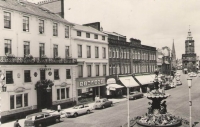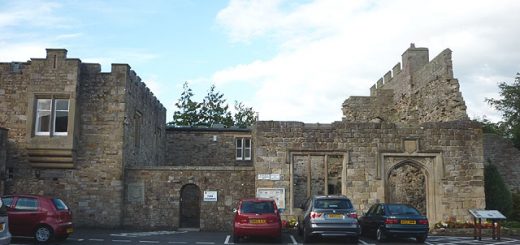Wimbledon Common
Wimbledon Common, Putney Heath and Putney Lower Common form a large area of heath land measuring 460 acres with an estimated million trees. This significant rural zone in Greater London is protected from being built upon by the 1871 Wimbledon and Putney Commons Act, however, the law does protect it from a reputation of being haunted by the notorious ‘The Laughing Highwayman’, Jerry Abershaw.
 Louis (Lewis) Jeremiah Abershaw (born 1773 – died 3 August 1795) from the age of seventeen terrorized the roads running between his native Kingston upon Thames and London via Wimbledon, reputedly using the Bald Faced Stag Inn on Portsmouth Road in Kingston as the base for his gang (which included “Galloping Dick” Ferguson). Comparing Jerry to the Prime Minister it was said that ‘Abershaw takes their purses with pistols — Pitt with Parliament’.
Louis (Lewis) Jeremiah Abershaw (born 1773 – died 3 August 1795) from the age of seventeen terrorized the roads running between his native Kingston upon Thames and London via Wimbledon, reputedly using the Bald Faced Stag Inn on Portsmouth Road in Kingston as the base for his gang (which included “Galloping Dick” Ferguson). Comparing Jerry to the Prime Minister it was said that ‘Abershaw takes their purses with pistols — Pitt with Parliament’.
According to the Newgate Calendar: ‘At length he was brought to trial before Mr Baron Perryn, at Croydon, in the county of Surrey, on the 30th of July, 1795. On his way to Croydon to take his trial, the cavalcade passed over Kennington Common, and on its arriving on the spot where the executions at that time took place, Avershaw put his head out of the coach window, and in the peculiar flash style which be ever exhibited, asked the officers attending whether they “did not think that he should be TWISTED on that pretty spot by the next Saturday?”
He was charged on two indictments: one for having, at the Three Brewers public-house, Southwark, feloniously shot at and murdered D. Price, an officer belonging to the police office held at Union Hall, in the Borough; the other for having, at the same time and place, fired a pistol at Bernard Turner, another officer attached to the office at Union Hall, with an intent to murder him.
Mr Garrow, the leading counsel for the prosecution, opened his case to the Court and jury by stating that the prisoner at the bar, being a person of ill fame, had been suspected of having perpetrated a number of felonies. A warrant had been issued for his arrest by the Southwark magistrates, and D. Price [David Price], and B. Turner [Bernard Turner], officers belonging to Union Hall, were intrusted with its execution. Having received information that he was smoking and drinking in a public house in Southwark called the Three Brewers, at that time notorious as the resort of thieves and vagabonds, they repaired thither, and found their information to be correct; but they also found that the object of their search was fully prepared to put in execution his diabolical threats. On their approach he placed himself at the entrance to the parlour with a loaded pistol in each hand, vowing the instant death of any one who should attempt to take him. The officers, more valiant than prudent, rushed forward, expecting to throw him off his guard by the suddenness and vigour of their attack; in this, however, they were unhappily deceived — the ruffian discharged both the weapons at the same moment, by one of which Turner was severely wounded in the head, while the fatal contents of the other lodged in the body of the unfortunate Price, who languished a few hours in great agony and then died.
The jury, after a consultation of about three minutes, pronounced the verdict of guilty. Through a flaw in the indictment for the murder an objection was taken by counsel. This was urged nearly two hours, when Mr Baron Perryn intimated a wish to take the opinion of the twelve judges of England, but the counsel for the prosecution, waiving the point for the present, insisted on the prisoner’s being tried on the second indictment, for feloniously shooting at Barnaby Windsor, which, the learned counsel said, would occupy no great portion of time, as it could be sufficiently supported by the testimony of a single witness. He was accordingly tried, and found guilty on a second capital indictment: The prisoner, who, contrary to general expectation, had in a great measure hitherto refrained from his usual audacity, began, with unparalleled insolence of expression and gesture, to ask his Lordship if he was to be murdered by the evidence of one witness. Several times he repeated the question, till the jury returned him guilty.
When the judge appeared in the black cap, the emblem assumed at the time of passing sentence on convicted felons, Avershaw, with the most unbridled insolence and bravado, clapped his hat upon his head, and pulled up his breeches with a vulgar swagger; and during the whole of the ceremony, which deeply affected all present except the senseless object himself, he stared full in the face of the judge with a malicious sneer and affected contempt, and continued this conduct till he was taken, bound hand and foot, from the dock, venting curses and insults on the judge and jury for having consigned him to “murder.”
This brutal conduct continued to the last. In the interval between receiving sentence of death and the execution, having got some black cherries, he amused himself with painting on the white walls of the cell in which he was confined, sketches of various robberies which he had committed; one representing him running up to the horses’ heads of a post-chaise, presenting a pistol at the driver, with the words, D–n your eyes, stop,” issuing out of his mouth; another where he was firing into the chaise; a third, where the parties had quitted the carriage; several, in which he was portrayed in the act of taking money from the passengers, and other scenes of a similar character.
He was executed on Kennington Common, on the 3rd of August, 1795, in the presence of an immense multitude of spectators, among whom he recognised many acquaintances and confederates, to whom he bowed, nodded, and laughed with the most unfeeling indifference. He had a flower in his mouth, and his waistcoat and shin were unbuttoned, leaving his bosom open in the true style of vulgar gaiety; and, talking to the mob, and venting curses on the officers, he died, as he had lived, a ruffian and a brute!
With Avershaw suffered John Little, who, having had employment at the laboratory of the palace at Kew, became acquainted with Mr Macevoy and Mrs King, persons of very advanced years, and who had been many years resident at Kew. Supposing they had some property at home, he watched an opportunity and murdered them both. ‘
Following the execution his body was then displayed in a gibbett at Jerry’s Hill (named after him) on Putney Common where it is said 100,000 visitors came to see his corpse.
Ghost
It is said that his ghost haunts Wimbledon Common galloping along on his steed. I have also come across a reference to the ghost of an escaped convict in the area.




Recent Comments